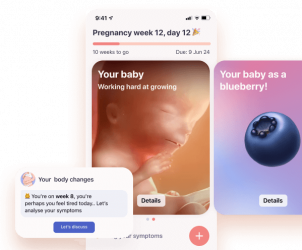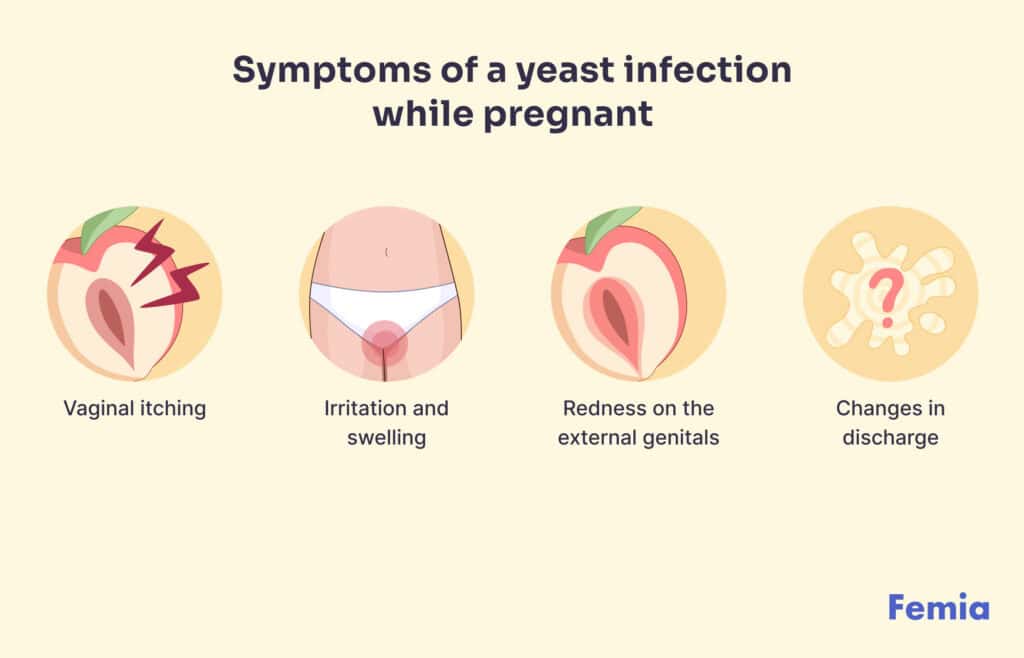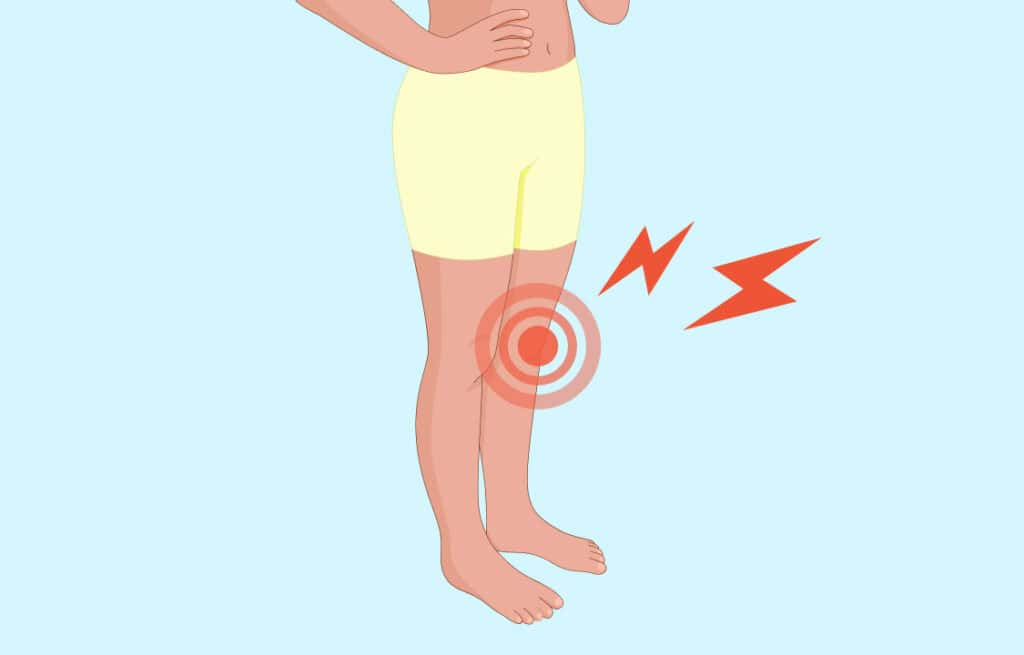Femia > Health Library > Pregnancy > Pregnancy health > Yeast infection while pregnant: Causes, symptoms, and safe treatments
Yeast infection while pregnant: Causes, symptoms, and safe treatments

- Updated Feb 20, 2025
- Published
CRAFTED BY HUMAN
Crafted by human At Femia, we provide accurate and up-to-date information at every stage of your journey, from trying to conceive, pregnancy and postnatal support. All content is created by a real person based on in-depth research and own professional experience. Femia ensures that you will receive expert advice, strict accuracy and a personalized approach from our authors/medical experts. Learn more about our editorial policy.
FACT CHECKED
Fact checked At Femia Health, we maintain the highest standards of editorial excellence in delivering content focused on helping you conceive, guiding you through pregnancy, and supporting you postpartum. Explore our content review principles to learn how we ensure the accuracy and quality of our health and lifestyle tips for every stage of your journey.
Facing yeast infection during pregnancy is common among mothers-to-be. Yeast infections may occur more frequently and progress faster during pregnancy due to hormonal changes, altered vaginal pH, and increased glucose levels, which create a favorable environment for fungal overgrowth. The main symptoms of yeast infection include vaginal itching, swelling, and white, cottage cheese-like discharge.
While yeast infections are generally not dangerous for pregnant individuals and their babies, untreated infections can cause significant discomfort and, in some cases, increase the risk of complications such as preterm labor. The safest treatment options include:
- Topical antifungal medications
- Switching to breathable, natural underwear
- Probiotics, dietary and lifestyle adjustments for supporting healthy vaginal flora, but they are not a treatment.
Yeast infections are rather common–up to 30% of women face them during pregnancy. This happens due to pregnancy-related hormonal changes that create a more favorable climate for infections.
Although a yeast infection while pregnant are typically not harmful to pregnant individuals or their babies, if left untreated, they can lead to significant discomfort and, in some cases, increase the risk of complications like preterm labor.
In this article, we will tell you about yeast infection during pregnancy and its causes, symptoms, and safe treatment options.

What causes yeast infections during pregnancy?
A vaginal yeast infection is a fungal infection caused by the overgrowth of Candida species, which are normally present in the vaginal microbiome. In a non-pregnant state, at least 20% of all women face this infection. However, this number rises to 30% in pregnancy.
So can pregnancy cause yeast infection? Although it doesn’t directly cause it (since the infection can also affect non-pregnant women), pregnancy can create more favorable conditions for its development due to the following factors:
Changing vaginal pH
Natural hormonal shifts during pregnancy alter the vaginal pH, making it less acidic. This reduction in acidity can decrease lactobacilli levels, allowing Candida to thrive and increasing susceptibility to infections.
Increased glucose levels
Pregnancy naturally causes your body to crave more food and increase its calorie intake, which is needed to support fetal development and store more fat for labor. An increased calorie intake and possibly lowered activity level can cause your blood sugar (glucose) levels to go up, creating a good environment for yeast overgrowth.
Weakened immune response
During pregnancy, the immune system adjusts to protect the growing baby, becoming less focused on attacking invaders and more on maintaining balance. This change can make it harder for the body to keep yeast growth in check, increasing the risk of infections.
👉Find out more: Cervical checks during pregnancy: What to expect and when they happen
Symptoms of a yeast infection while pregnant

The first symptoms of a yeast infection during pregnancy include:
- Vaginal itching
- Irritation and swelling
- Redness on the external genital area
- Changes in discharge appearance, consistency, and smell
Other symptoms of a yeast infection during pregnancy can include a burning sensation or pain during urination and intercourse. If these symptoms are severe or persistent, consult a healthcare provider to rule out other infections.
How to distinguish a yeast infection from other vaginal infections
Symptoms like itching, irritation, and discomfort can also occur with other vaginal infections, such as bacterial vaginosis. However, these conditions differ in the type of vaginal discharge and its odor. To tell the difference, check the appearance of your discharge.
In a yeast infection, vaginal discharge is typically white, creamy, or slightly yellowish. Yet, the consistency of discharge is most commonly thick and with clumps that resemble cottage cheese. Yeast discharge may not have any smell or a slight odor of yeast/bread, while bacterial vaginosis has a fish odor. Additionally, there might be a creamy, whitish coloring inside your vagina and on the external genital area.
When to see a doctor for a diagnosis
The aforementioned recommendations may help you recognize whether you have a yeast infection or another condition. However, a healthcare provider can provide an accurate diagnosis and appropriate treatment.
Also, don’t hesitate to seek medical advice if you are experiencing significant discomfort or pain.
Are yeast infections dangerous during pregnancy?
When facing the symptoms, many women start wondering–is it dangerous to have yeast infection early pregnancy, mid-pregnancy, or during your final term? Although yeast infections are uncomfortable, they typically do not pose a serious risk during pregnancy. However, untreated infections in the third trimester may slightly increase the risk of preterm labor and can be passed to the baby during delivery. That’s why treating them in a timely fashion is important for your comfort and safety.

How to treat a yeast infection while pregnant
Although yeast infections can be very unpleasant, they are easily treated with the help of topical solutions. Here is what to use for yeast infection while pregnant:
- Clotrimazole – this active element can be found in Canesten, Mycelex, and Lotrimin AF.
- Miconazole – this active compound can be found in Monistat 3.
These medicines are over-the-counter and come in the form of creams, ointments, and suppositories that are safe to use at different stages of pregnancy. A seven-day treatment formula might be the optimal choice for addressing yeast infection while pregnant.
Additionally, if you’re looking for information on how to treat yeast infection while pregnant, there are a few additional at-home remedies that can help ease the symptoms:
- Consuming probiotics (for example, in the form of Greek yogurt) can help promote a healthy environment in your vagina and prevent yeast overgrowth. Some studies suggest that probiotics may help maintain a balanced vaginal microbiome, potentially reducing the risk of yeast overgrowth. However, more research is needed to confirm their effectiveness in treating yeast infections.
- Wearing breathable cotton underwear can help you support your vaginal health, whereas synthetic materials can trap heat and moisture, creating a perfect environment for yeast breeding.
👉Find out more: Best positions to relieve gas while pregnant for immediate comfort
What treatments to avoid during pregnancy
Apart from the creams, ointments, and suppositories mentioned earlier, there are also oral medicines meant to treat yeast infections. Oral antifungal medications, such as fluconazole, have been associated with an increased risk of pregnancy complications, including miscarriage and certain congenital anomalies when taken in high doses or for prolonged periods. Due to these risks, oral antifungals are generally not recommended during pregnancy.
Generally, topical solutions are thought to be both effective and safe for yeast infection treatment while pregnant.
How to prevent yeast infections during pregnancy
Now that you know how to get rid of a yeast infection while pregnant, let’s quickly review general tips on how to prevent this infection in the first place:
Hygiene tips
- Opt for breathable underwear made of natural materials that don’t trap heat and moisture that cause infection to grow.
- Change your underwear daily.
- Change your underwear and clothes right after exercise or swimming.
- Avoid tight pants that can create a warm environment suitable for yeast growth.
- Avoid scented feminine hygiene products, as they can disrupt the natural vaginal flora. Instead, clean the external genital area with warm water and mild, fragrance-free soap if needed.
Health and lifestyle changes
- Pregnancy increases susceptibility to infections, so practicing safe sex can help reduce the risk of introducing new bacteria or disrupting vaginal balance.
- If you have gestational diabetes, address it accordingly to prevent high blood sugar levels.
- Take the recommended prenatal vitamins and follow a balanced, nutritious diet to support your immune system.
Dietary adjustments
- Implement a candida cleanse diet that focuses on leafy greens, lean proteins, healthy fats, veggies, fruits, nuts, and seeds to support overall health and immune function.
- Cut down your intake of refined carbs and sugary foods that affect blood sugar levels.
- Maintain proper hydration.
- Integrate probiotic-rich foods like kefir, Greek yogurt, and fermented foods to help support your vaginal flora balance.
Questions from the Femia community
Are yeast infections common during pregnancy?
Yes. Although such infections can be rather unpleasant and frustrating, facing them in pregnancy isn’t uncommon. In fact, up to 30% of pregnant females end up dealing with yeast infections.
Can yeast infections be an early sign of pregnancy?
Typically, a yeast infection is not considered a direct sign of early pregnancy. However, since these infections occur due to hormonal changes, they may be more likely to arise in early pregnancy, when you experience the first hormonal shifts.
Is it safe to use Monistat or Canesten while pregnant?
Yes, topical antifungal solutions that contain miconazole and clotrimazole are considered safe and effective for treating yeast infections in pregnancy. Still, it’s recommended to consult with a healthcare provider before starting any treatment.
Can a yeast infection go away on its own during pregnancy?
While mild yeast infections may sometimes improve on their own, they typically require treatment to prevent worsening symptoms and prolonged discomfort. Early treatment is recommended to ensure effective relief.
Does a yeast infection affect labor and delivery?
In most cases, yeast infections are harmless. They don’t pose any significant risk to mothers-to-be or their children and typically don’t affect labor. However, if the infection is untreated, its symptoms can cause discomfort during childbirth.
Can I pass a yeast infection to my baby?
Although it’s rare, there is a small chance that the infection will be passed to a newborn. It can happen if you face a yeast infection at the end of your pregnancy and it remains untreated at the moment of vaginal delivery. In this case, a child can get an oral thrush, but it is treatable.
The bottom line
Facing yeast infection while pregnant isn’t uncommon. In fact, hormonal fluctuations that take place during pregnancy can make you more vulnerable to such infections. While they are usually not dangerous, they can cause significant discomfort and should be treated promptly to prevent complications.
After reading this guide, you should have a better idea of how to prevent the occurrence of yeast infection through proper hygiene, nutrition, and lifestyle. However, if you still face the infection, don’t worry because there are many pregnancy-safe topical medications that should help treat it. So don’t hesitate to consult with a healthcare provider if you notice any symptoms to receive an accurate diagnosis and personalized treatment recommendations.
References
- “Answers to 6 burning questions about yeast infection during pregnancy.” UTSouthwestern Medical Center, 20, Sep. 2022. https://utswmed.org/medblog/yeast-infection-pregnant/.
- Aguin, T.J., Sobel, J.D. “Vulvovaginal Candidiasis in Pregnancy.” Curr Infect Dis Rep, 28, Apr. 2015. https://link.springer.com/article/10.1007/s11908-015-0462-0#citeas.
- “8 Ways That Pregnancy Affects Vaginal Health.” Dr. Bevan Brown. https://drbevanbrown.com.au/8-ways-pregnancy-affects-vaginal-health/.
- “Gestational Diabetes.” Cedars Sinai. https://www.cedars-sinai.org/health-library/diseases-and-conditions/g/gestational-diabetes.html#:~:text=During%20pregnancy%2C%20more%20fat%20is,makes%20more%20of%20the%20hormones.
- Pazos M, Sperling RS, Moran TM, Kraus TA. “The influence of pregnancy on systemic immunity.” Immunol Res, Dec. 2012. https://pmc.ncbi.nlm.nih.gov/articles/PMC7091327/#:~:text=There%20does%20exist%20strong%20evidence,symptoms%20in%20some%20autoimmune%20diseases.
- “What is a yeast infection?” Planned Parenthood. https://www.plannedparenthood.org/learn/health-and-wellness/vaginitis/what-yeast-infection#:~:text=Yeast%20infections%20often%20cause%20thick,in%20or%20around%20the%20vagina.
- Kunyeit L, K A AA, Rao RP. “Application of Probiotic Yeasts on Candida Species Associated Infection.” J Fungi (Basel), 25, Sep. 2020. https://pmc.ncbi.nlm.nih.gov/articles/PMC7711718/.

Learn how ovulation affects your emotions and triggers mood swings. Discover the causes, common symptoms, and treatment methods to manage your mood swings effectively.

Explore an in-depth guide of the symptoms, causes, treatment, prevention, supplements, and natural remedies for menopause joint pain.

After having a baby, it’s normal your sex life changes, especially if you’re breastfeeding. Explore why it does and how to improve your breastfeeding sex.

